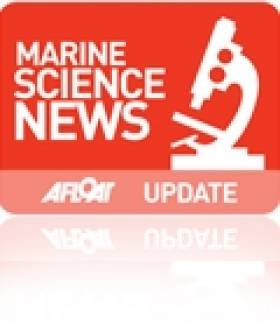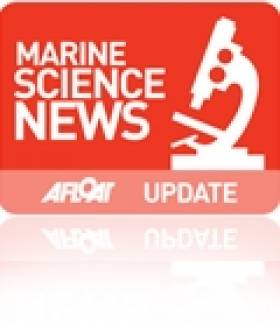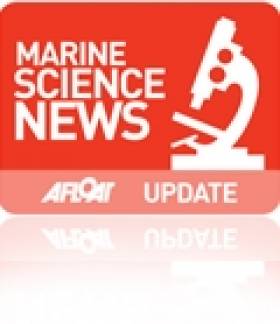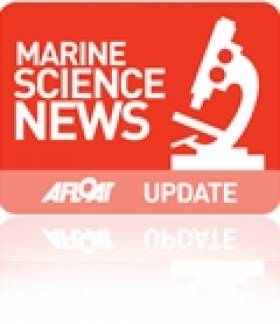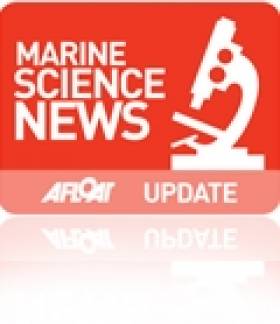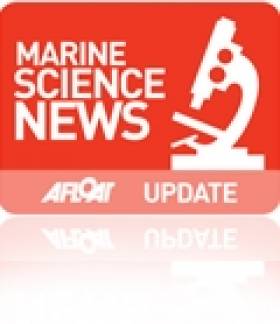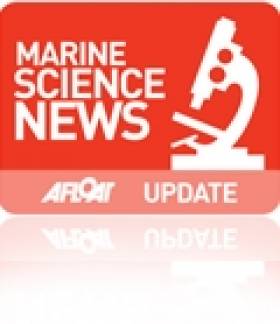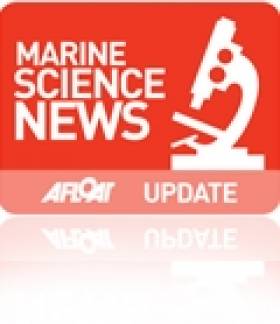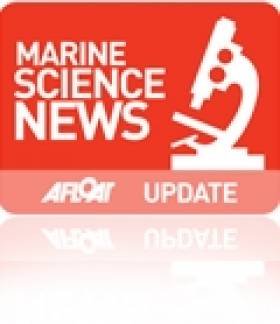Displaying items by tag: marine science
#MarineScience - Marine scientists from Ireland, the UK, US and Germany are starting to examine data collected from the Marine Institute's recent research mission to the Whittard Canyon in the North Atlantic, according to RTÉ News.
As previously reported on Afloat.ie, researchers spent two weeks earlier this month exploring the sea bed of the deep ocean canyon some 250 miles southwest of Cork, using the institute's ROV Holland I to study the diversity of marine wildlife at depths of as much as 3km below the surface.
Among their finds so far is a rare black coral, while samples of deep sea sponge were also taken for analysis of climactic changes to the subsea ecosystem. RTÉ News has more on the story, including video, HERE.
Frenchman's Plan For 'Starship Enterprise Of The Seas'
#NewDesign - The Verge has some beautiful artists' renderings of a proposal for an amazing ocean laboratory that's been dubbed 'the Starship Enterprise of sea exploration'.
The brainchild of architect and oceanographer Jacques Rougerie, the SeaOrbiter is the culmination of 30 years of research into undersea habitats and, if realised, would employ the latest in solar and wind power technologies to sustain itself in the ocean with minimum impact on the environment.
Rougerie hopes to have a prototype craft ready to launch by the end of 2016, provided he can raise the $46 million required for the project.
The Verge has much more on the story HERE.
#marinescience – The annual Marine Institute bursary programme gets underway this month (June, 2014) with 22 third-level students. Over eight weeks the students will work in a variety of areas including fish and shellfish assessments and surveys, sampling salmon and commercial fisheries in ports, maritime economics, oceanographic equipment modifications and communications.
"The student summer bursary programme has been ongoing since the 1960's and has great historical importance to the marine science sector. The work experience programme enables students from a wide variety of disciplines to further their knowledge and research in their particular area of interest and it offers the students to expand their professional networks within Ireland and abroad," explained Ms. Helen McCormick, Senior Laboratory Analyst at the Marine Institute and co-ordinator of the bursary programme for 2014.
The students will gain hands on experience at different locations around Ireland, including the offices and laboratories at the Marine Institute - Galway, Harcourt Street - Dublin and Burrishoole Catchment - Newport, County Mayo. Some students will also be located at fisheries ports in counties Cork, Waterford and Louth.
With the publication of "Harnessing Our Ocean Wealth" in July 2012, Ireland is expected to promote investment and enable growth within the marine sector. The bursary programme offers a promising gateway into the expanding areas of marine science and research in Ireland.
The programme is well recognised and aims to promote future employment opportunities for undergraduates and postgraduates. Dr Peter Heffernan, CEO of the Marine Institute congratulated all successful bursars on this years programme saying, "The Institute is delighted to support this excellent learning opportunity for Irish students".
#MarineScience - Marine-related postgraduates (MSc and PhD) across Ireland and Germany are being offered a unique opportunity to gain offshore marine research and training skills and experience acting as chief scientists of their own research voyage from 11-17 September as part of the 2014 Atlantic Summer School.
The five days of research onboard the RV Celtic Explorer will focus on a multidisciplinary investigation of cold water coral ecosystems off the Belgica Mound Province, a Special Area of Conservation (SAC) approximately 100km south-west of Ireland.
“These unique environments are biological hotspots with diverse animal life associated with the reef-building corals," says Dr Paulha McGrane, national co-ordinator of the Strategic Marine Alliance for Research and Training (SMART) in Ireland.
"Formed over millennia, the giant carbonate mounds reach up to 300m high, at depths of between 550 and 1060m in the ocean.”
Dr McGrane adds that postgraduates "will gain experience acquiring, processing and archiving samples taken from the mounds, which provide high-resolution records of long term climate change.
"Using a variety of novel equipment and instrumentation, the survey will focus on the biological, geological and oceanographic dynamics that control the development and decay of carbonate mounds.”
In addition, the Atlantic Summer School includes pre-survey meetings (via Skype), pre-cruise preparation in Cork and post-survey data analysis and reporting in Galway. The course also involves distance learning, lectures and practical shore-based workshops.
“This pooled infrastructure and expertise from Ireland and Germany’s higher education institutes [respectively, SMART and the Alfred-Wegener Institute for Polar and Marine Research (AWI)] provides an incredible chance for postgraduates to get the necessary practical experience and develop networking opportunities they need early in their careers,” says Prof Karen Wiltshire, vice-president of the AWI.
“We are all pleased to be part of this strategic collaboration, which will ultimately develop careers pathways and mobility for students between the island of Ireland and Germany and increase multidisciplinary research capacity in Atlantic nations."
Dr Peter Heffernan of the Marine Institute congratulated all involved in this important initiative on board the RV Celtic Explorer, and expressed his delight in "supporting this excellent training opportunity for Irish postgraduates”.
Online application forms must be completed and received by 17:00 CET on Friday 6 June 2014. Applicants will be informed on the outcome of evaluations by 20 June 2014.
For further information please visit the SMART website or contact [email protected].
#BlueEconomy - The European Commission last week presented an Action Plan for Innovation in the 'Blue Economy' to help use ocean resources responsibly and sustainably as sources of food, medicine and energy, and drive growth and jobs in Europe.
Marine Institute chief executive Dr Peter Heffernan said the plan "reflects the importance of the oceans impact on our daily lives and the urgent need to better understand our oceans in order manage them responsibly to generate benefits for all citizens.
"It’s a very welcome initiative and consistent with initiatives already underway here in Ireland such as Harnessing Our Ocean Wealth - An Integrated Marine Plan for Ireland, which aims to increase the turnover from our ocean economy to exceed €6.4 billion by 2020.”
A key objective of the action plan is to create a digital map of the entire seabed of European waters by 2020. Maps like those developed by the INFOMAR programme in Ireland are also crucial for accurate localised models of climate change and forecasting.
Meanwhile, opportunities for Irish marine researchers will be enhanced by the focus on blue growth in the new Horizon 2020 programme, with a specific €145 million budget for 2014-2015 alone, and further opportunities across the programme.
There are also plans to look at the possibility of forming a 'Knowledge and Innovation Community' made up of major players from the research, business and education communities.
In addition, the the blue innovation action plan proposes to set up a Blue Economy Business and Science Forum, which will involve the private sector, scientists and NGOs to help shape the blue economy of the future and share ideas and results.
“Ireland’s marine plan has established similar forum – a ‘marine development task force’ to look at pushing opportunities and significantly moving the plan forward,” said Dr Heffernan.
"All of this will mean more opportunities for Irish researchers and business to partner and support EU initiatives on marine economic development in line with our national integrated marine plan.”
Explorers Programme Seeks Expressions Of Interest In Producing Primary Teaching Materials
#MarineScience - The Explorers Marine Education Programme is looking for expressions of interest from those with experience in the primary education sector and an interest in the marine, to develop a range of marine-themed primary school lesson plans and worksheets.
Subjects for focus under the recently expanded programme include English, Geography, Visual Art, Mathematics, Music, Science and PE.
The Explorers Marine Education Programme has been running for over eight years in Galway, Mayo, Dublin and Cork and has a number of educational materials available on www.explorers.ie.
The programme was established by the Marine Institute and Galway Atlantaquaria and is supported by the Galway Education Centre, Sea Life Bray, Blackrock Education Centre and the Lifetime Lab, Cork.
Education officer Dr Noirín Burke says the programme “aims to raise awareness and interest in Ireland’s marine resources and environment and presents many of opportunities to teach subjects in primary school that relate to the marine environment, marine species, marine technology and our oceans."
Any current or former primary school teachers interested in producing Explorer educational materials during the months of June to October will find more details in the expression of interest document HERE.
Further enquiries can be directed to Dr Burke at 085 754 0836 or [email protected]. The closing date for expressions of interest is Friday 16 May 2014.
#MarineScience - Two marine scientists associated with the Marine Institute through research carried out under the Sea Change Strategy have gone on to win support for specific small projects through the newly established International Council of the Exploration of the Sea (ICES) Science Fund.
Earlier this month ICES announced eight projects to be supported through the new Science Fund and focused on those that will add value to the ICES Science Plan of achieving integrated marine ecosystem understanding.
Dr Peter Heffernan of the Marine Institute congratulated Dr Sarah Kraak and Dr Kathryn Hughes on their projects being selected, saying: “It is a great achievement for the two researchers associated with the Marine Institute to be awarded the ICES funding.
"By encouraging researchers to engage with both academic and government institutions, this allows us to provide the best available science and knowledge and to make informed decisions of our ocean wealth at a national and international level.”
Dr Sarah Kraak from University College Cork is currently a postdoctoral fellow working on research to develop and test through simulation a suite of measures that will contribute to rebuilding depleted fish stocks in waters around Ireland carried out under the Sea Change Strategy and funded by the Marine Institute.
As lead scientist, Dr Kraak’s ICES project is called 'Insights from Behavioural Economics to improve Fisheries Management', and is co-lead by Ciaran Kelly from the Fisheries Ecosystem Advisory Services at the Marine Institute.
“Conventionally, fisheries management aims to modify the behaviour of fishers with laws and regulations," said Dr Kraak. "This method of a top-down control may not always fully achieve its objectives, owing to the interests of the individual fishermen.
"Therefore, using the discipline of Behavioural Economics, the project aims to research what drives human behaviour in fisheries. This approach may prove to be more useful in fisheries management and achieving sustainable resource exploitation."
In addition to the ICES funding, this project has already attracted a small grant from the Fisheries Society of the British Isles (FSBI).
The other project is a postdoctorate project led by Dr Kathryn Hughes from Bangor Universtiy in the UK. Dr Hughes recently completed her PhD on the impact of climate change on the distribution, biology and productivity of fish stocks in waters around Ireland, which was funded by the Marine Institute under Sea Change and co-supervised by Leonie Dransfeld from the Marine Institute.
Following completion of her PhD, Dr Hughes is now working on an international project called 'Developing Methods for Determining a Global Footprint of Mobile Bottom Fishing Using VMS Data', which aims to highlight the effects of trawling from countries that do not have the required resources to process and analyse raw fishing effort data.
ICES co-ordinates and promotes marine research in the North Atlantic Ocean, the North Sea, and the Baltic Sea, and advises international commissions and governments on marine policy and management issues related to the impacts of human activities on marine ecosystems and the management of the exploitation of living marine resources. ICES is working towards integrated ecosystem assessments and integrated advice, delivered at the regional seas level.
ICES is a network of more than 4,000 scientists from almost 300 institutes, with 1,600 scientists participating in activities annually from 20 member countries. To view the full list of projects and to follow their development, visit the ICES website HERE.
#MarineScience - Applications are now invited for the Atlantic Summer School 2014 to be held on board Irish national research vessel RV Celtic Explorer from 11-17 September.
The school is a collaboration between the Strategic Marine Alliance for Research and Training (SMART) and the Alfred Wegner Institute for Polar and Marine Research (AWI), with ship time provided by the Marine Institute, and is open to all marine-related postgraduate students (MSc and PhD) from across the island of Ireland and Germany.
The 2014 Summer School aims to build capacity in offshore marine research by providing early-stage career scientists with the knowledge and skills necessary to act as chief scientists on research surveys.
Participants will conduct a multidisciplinary investigation of cold water carbonate (CWC) ecosystems off the Belgica Mound Province, which is a Special Area of Conservation (SACs) approximately 100km southwest of Ireland.
In addition to the five days of seagoing research, the school includes pre-survey meetings via Skype, pre-cruise preparation in Cork and post-survey data analysis and reporting in Galway.
Course content will include:
- Pre-survey meetings and lectures on the study site, SACs and CWC ecosystems.
- Practical shore-based workshop designing and planning the survey.
- Deployment and operation of novel equipment and instrumentation.
- Acquisition, processing and archiving of samples.
- On-board evening survey meetings and lectures.
- Post-survey data processing, analysis and open source publishing.
- Reporting initial findings through working groups.
The collaboration is designed to forge mobility pathways for early career researchers between Ireland and Germany and serve as an excellent networking opportunity for all participants.
This is the first of a series of summer schools that will alternate between Irish and German research vessels, with the 2015 school taking place on the RV Heincke.
Training will be overseen by experts from University College Cork, NUI Galway, University of Ulster, Alfred Wegner Institute and SMART.
Online application forms must be completed and received by 5pm CET on Friday 6 June 2014.
For further information and an online application form please visit the Atlantic Summer School website or contact [email protected].
Please note that all travel and shore-based accommodation costs are the responsibility of summer school participants. Successful applicants must have or plan to secure a valid Medical Certificate approved by the state (ENG11 in Ireland) and Personal Survival Techniques (PST) certificate approved under the STCW 78/95 convention.
Irish–Newfoundland Transatlantic Research on RV Celtic Explorer
#marinescience – The RV Celtic Explorer leaves Galway today (12th April) for Newfoundland and Labrador, on its fourth multi-institution transatlantic survey. The 13 day expedition across the Atlantic to St Johns, Newfoundland will involve four scientists from NUI Galway, as well students from UCC and GMIT. A team of six of scientists lead by Dr. George Rose from the Fisheries and Marine Institute of Memorial University, Newfoundland, will work alongside nine Irish scientists during the voyage.
The collaboration with Newfoundland and Labrador builds on the strong relationship established since the first Newfoundland survey on the Celtic Explorer in 2011.
"Such cooperation is key to improving our ocean wealth and promoting the sustainable management of its resources. It's hugely important for Ireland and brings us closer to achieving the goals of the 'Galway Statement on Atlantic Ocean Cooperation' signed here at the Marine Institute Galway last May by the EU, USA and Canada ", said Dr. Peter Heffernan, CEO Marine Institute.
Irish scientists onboard will study the rich and diverse pelagic ecosystem across the Atlantic Ocean. "Marine scientists from NUI Galway will study the oceanography and the deep scattering acoustic layers of the water columns using multi-frequency acoustics. This is then related to zooplankton abundance and ultimately to fish abundance, providing us with a better understanding of the ecosystem," explained Dr. Louise Allcock from NUI Galway.
Scientists from Galway Mayo Institute of Technology will study plastics found in the ocean. Micro-plastic debris is made up of tiny plastic granules, fibres and fragments less than 5mm in diameter. Although plastics are beneficial materials, micro-plastics appear to be pervasive in the ocean and scientists do not yet fully understand the impact that small plastic particles can have on the food chain. Ingesting the tiny particles may be toxic to the animals, and may prevent them from consuming their natural prey.
"We hope this research will help to raise awareness of the effects of plastics in the ocean and provide better ecosystem assessments across the Atlantic," said Ms Amy Lusher from Galway Mayo Institute of Technology who is completing a PhD on this topic.
Seabird and marine mammal observations will also be conducted by Aoife Foley from Galway Mayo Institute of Technology and Ashley Benison from University College Cork. These animals are considered top predators in the pelagic environment and the abundance of fish and zooplankton, their prey, ultimately affects their distribution and survival.
The Newfoundland team of scientists will continue their strong collaboration with the Irish scientists. "This collaboration is now into its 4th year with a major paper based on linking acoustic, biological and oceanographic data from 2011-2013 presented at the recent international Marine Science Conference in Hawaii," explained Dr Rose.
Sharing information and experiences with scientists from both sides of the Atlantic allows Irish researchers to forge strong links with our Newfoundland and Labrador – Canadian counterparts.
"Being the western and eastern bookends of the North Atlantic, and given our shared history, it seems only right that Newfoundland and Ireland scientists should work together on problems of mutual interest, and this has indeed proven to be very enjoyable and highly productive" Dr. Rose further stated.
New Call For Ship Time On Irish Research Vessels
#MarineScience - The Marine Institute has announced an additional call for funded ship time on the RV Celtic Explorer and the RV Celtic Voyager.
Applications are invited from research performing organisations including higher education institutions, public research bodies and industry to carry out ship-based research activity.
The areas of research may relate to: ecosystems approach to marine resource management; seabed processes and resources; climate/environmental change; renewable ocean energy; biodiscovery/biodiversity; novel marine technologies; and marine policy/legislati
Applications from early stage researchers, including PhD students or early post-doctoral researchers, are particularly encouraged to apply, to allow emerging marine scientists the opportunity to gain hands-on experience in undertaking ship-based research.
Applications will only be accepted for a limited number of days - one week in September 2014 on the RV Celtic Explorer, and up to three weeks with available dates in July, September, October and December 2014 on the RV Celtic Voyager.
The closing date for receipt of applications is 3pm on Thursday 17 April 2014. Applications must be submitted using the Research Vessel Operations' online Survey Planning System (SPS) and Research Information Management System (RIMS), which are available on www.marine.ie. (Please contact the Research Vessel Operations team at [email protected] to obtain a password for SPS.)
The Vessel Charter Guidelines 2014-1015 (Word doc 253KB) should be read carefully before submitting the Ship-Time Application Form.
Applicants may seek grant-aid to cover all or part of the vessel charter costs for research surveys. For information on eligibility for grant-aid and how to apply, read National Research Vessels 2014 Ship-Time Programme Grant Aid Guidelines (PDF 577KB).



























